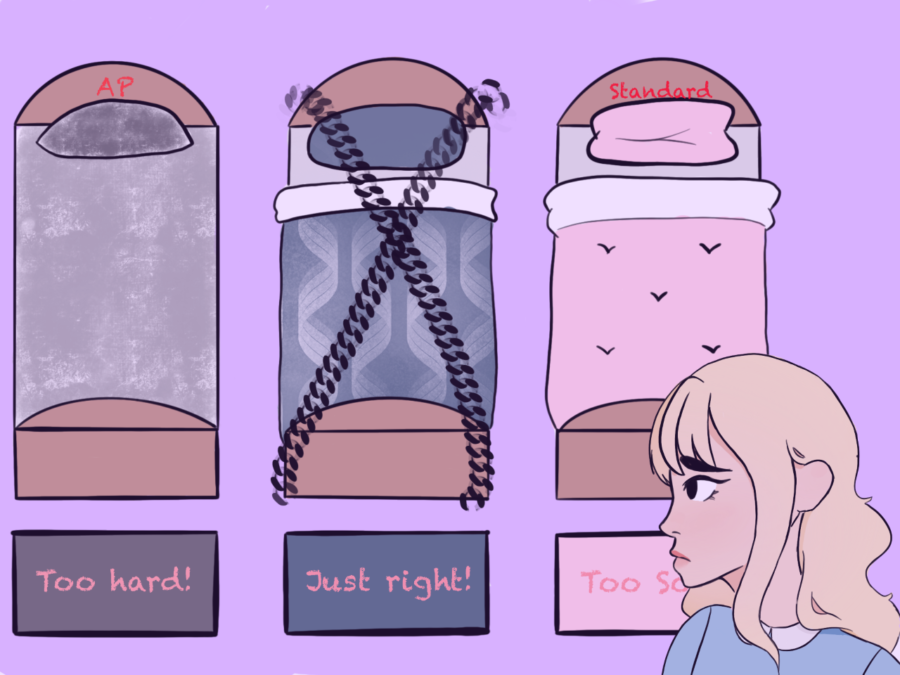Running out of options
photo by Areli Smith
As changes were made by the state and school, multiple honors classes have been cut. This leaves many students feeling as though the available options for next year are either too rigorous or not challenging enough.
A white piece of paper with seven blank slots sits in front of you with a curriculum guide and a visit from a guidance counselor. Every year, high school students face this scenario, and while filling in these blanks with fun electives like Ceramics, Culinary and Dance may be easy, choosing core subject classes is becoming more difficult with each decrease in options.
Within the past year, both the school and Florida Department of Education have cut classes in mathematics and language, and many have not been replaced with alternative courses. Taking away these honors options from students essentially forces them into taking AP courses that many may not feel ready to take. These decisions by the school and state will cause students to turn to Dual Enrollment or FLVS classes that still have previously offered courses, but online learning is not suitable for every student.
The lack of options for next year in multiple course areas places a lot of unneeded pressure on students as their high school and college GPAs could be affected. Students should be given more options to suit their needs and allow them to push themselves while still being successful.
According to Assistant Principal Kristi Draus, who advises the math department, the state notified districts of the decisions to cut Trigonometry, Analysis of Functions, Liberal Arts 1, Liberal Arts 2 and Math for College Readiness during the first quarter of the 2021-2022 school year. With no reasons given for these cuts, the school is left to find replacements. The school is looking to add Mathematics for College Algebra, Mathematics for Liberal Arts and Mathematics for Data and Financial Literacy, but all of these are standard level classes. With no honors courses offered by the state to replace Trigonometry and Analysis, students currently in Algebra 2 Honors are left with few options.
In the school’s current flow chart from the 2022-2023 curriculum guide, students in Algebra 2 Honors must either jump to Precalculus, move into a standard level course or take one that does not allow them to reach their full academic potential. While Precalculus is an honors class, the curriculum can be too demanding on students who struggled in Algebra 2 Honors. As the course prepares students to take AP Calculus, its rigor is understandable, which begs the question: why would students take the class if they don’t plan on taking AP Calculus?
Even though no student is obligated to follow the AP track after taking Precalculus, it seems unnecessary for those students that planned on taking other classes their senior year, like AP Statistics or Calculus Honors. Even with the re-writes for Precalculus and other math courses next year, which is required by the state to follow Benchmarks for Excellent Student Thinking (B.E.S.T.) standards, many students still worry about taking Precalculus from what they have heard in past years and do not want to take the risk of affecting their GPA.
However, the other option for honors students is just as or even more anxiety-inducing: Dual Enrollment. Dual Enrollment at local colleges like Seminole State or UCF can bring a great opportunity for students that wish to begin taking college-level courses. However, no student should have to feel forced into making this big decision.
With the new circumstances, the math department expects to see an increase in Dual Enrollment for next school year as colleges still offer Trigonometry and alternative courses for Analysis of Functions, like Precalculus Algebra. Even if there were an in-person replacement course for Trigonometry and Analysis of Functions, Dual Enrollment allows students to be granted college credit for their classes, and it is essentially free higher education with the same GPA weight as AP classes. But even with these pros, there are still a number of cons.
While unlike AP classes that require a mandated AP exam in order to earn college credit, Dual Enrollment credit is automatic, meaning it also automatically affects students’ college GPAs before they’ve even graduated high school. This raises concern for students taking Dual Enrollment courses as it may have an effect on both their current and future academic records, especially in a society that holds a high value on performing well in high school and getting accepted into competitive universities.
Although there are many concerns over math course selections for next year, this subject is not the only problem area. In order to be eligible for college acceptance, students must have two world language credits, but competitive universities look for three or more years of language study. For students taking Spanish as their world language, their options have also been limited.
In previous years, including the current school year, Hagerty has offered Spanish 1, 2, 3, 4, AP Spanish Language and AP Spanish Literature. However, Spanish 4 will no longer be offered in-person next school year, causing more students to flow into the AP level classes.
While this may not affect most students as they must be in Spanish 3 to feel the effects, this will hurt students that planned on earning their Biliteracy Diploma, which requires four years of a world language. Furthermore, native Spanish speakers are required to start at Spanish 3, meaning it will also be more difficult for them to earn four years of a language. This means that students taking Spanish that aim for this goal must either take AP or switch to virtual Spanish 4 offered on FLVS and SCVS. Some may see this as an opportunity to earn their online class graduation credit, but learning a language through a screen can be extremely difficult.
With the FLVS and SCVS curriculum, Spanish classes can be completed quickly, even within 8 weeks, while the in-person class takes 10 months. This may not allow students to learn as much content in their online courses, especially since the curriculum contains mostly reading practice, giving the students less time speaking the language besides their occasional Discussion-Based Assessments. This could lessen their understanding in language courses taken in college. However, students’ understanding of the language may also be impacted when taking the AP Spanish courses if they are not yet at that level, impacting both their ability to speak the language and their GPA, leaving more room for anxiety.
As the honors classes that are cut for next year have no in-person replacements, many students will end up flowing into the AP course tracks, and it is hard not to wonder: is this the school or state’s intention? More students in AP classes means more AP tests will be taken and passed, which would bring in more money to the school from the state. The school’s focus on getting students into college-level courses forces them into classes they do not yet have the understanding to be successful in and did not plan on taking. With added pressure from teachers and parents to get into colleges and universities, many students will find themselves taking more APs than they can handle in order to avoid limiting their potential in standard level classes. Decisions made by the state and the school have both contributed to the already stressful process of selecting courses for next year, and with a newfound lack of options in multiple subjects, those seven blank slots are even harder to fill in.
Your donation will support the student journalists of Hagerty High School. We are an ad-free publication, and your contribution helps us publish six issues of the BluePrint and cover our annual website hosting costs. Thank you so much!







